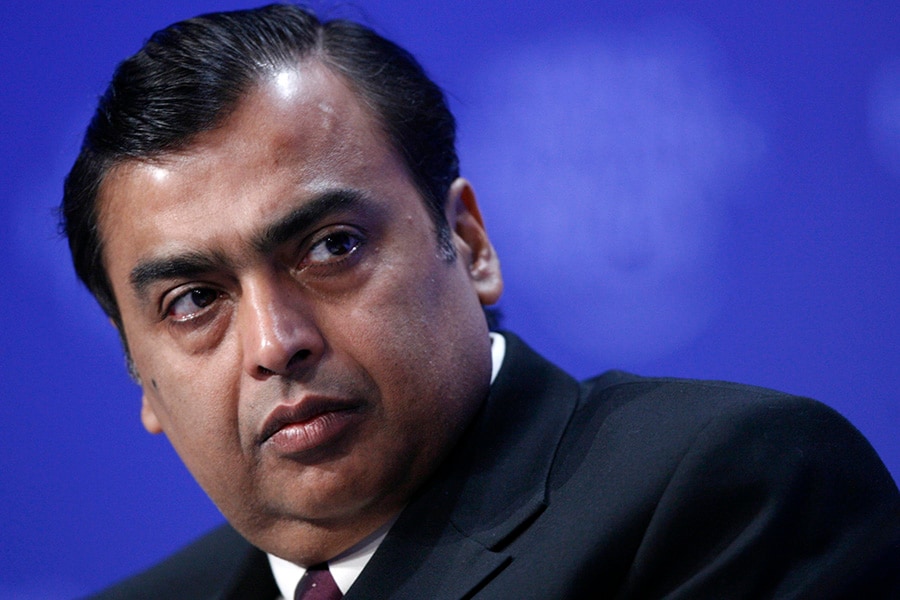Mukesh Ambani: Data is the new oil; Trump blessing in disguise for India
Domestic information technology sector will now focus on solving problems faced by Indians, chairman of Reliance Industries says


 Mukesh Ambani is India’s richest billionaire and chairman of Reliance Industries Ltd
Mukesh Ambani is India’s richest billionaire and chairman of Reliance Industries Ltd
Image: Denis Balibouse / Reuters
The ascendancy of Donald Trump to the US presidency may be a “blessing in disguise” for India, as the domestic information technology (IT) sector will now focus on solving problems faced by Indians, according to Mukesh Ambani, India’s richest billionaire and chairman of Reliance Industries Ltd (RIL).
Ambani, who has led the aggressive rolled out pan-India fourth generation broadband wireless data and voice services through Reliance Jio, was speaking at the Nasscom India Leadership Forum 2017 in Mumbai on Wednesday.
The protectionist stance that Trump, who came to power in January, has taken with a view to boost the American economy and bring jobs back, has left the Indian IT industry concerned about its fate. Indian IT has been one of the biggest beneficiaries of US-based companies outsourcing their technological needs to it. This has led to several jobs for Indian software developers and business analysts over the years, with many of them getting to work overseas on client projects. The Trump administration’s plans to bring in changes to visa regulations may make it unviable for Indian companies to depute employees on such projects at their current salary levels. It may also force them to increasing local hiring in the US, which would push up costs and erode the margins they earn on such services rendered.
Ambani, 59, articulated his perspective on what he feels is the fourth industrial revolution gripping the world, which is characterized by the “convergence of physical, digital and biological sciences.”
“I have only understood four years ago the true meaning of the term exponential,” Ambani said. “I believe we are on the verge of exponential change, where we have the opportunity to solve large problems in a short span of time,” Ambani said.
Ambani helms a conglomerate that was founded by his father Dhirubhai Ambani as a textile company, which through a process of backward integration emerged as the oil-to-yarn conglomerate that it is today. It ventured into its first consumer-facing business with its retail operations and seeks to touch the lives of all Indians through its new-age broadband and digital services.
At one of the company’s recent annual general meetings, Ambani used the phrase: “Data is the new oil.” Further elaborating on what he meant by that, Ambani said that he believed data was the new-age natural resource that will be created and consumed by people – and India with its 1.3 billion-strong population will have a “competitive edge” when it came to leveraging this natural resource.
But just like oil in its crude form has little value and needs to be distilled and refined to be put to use, raw data also needs to be further processed into intelligence for it to be useful, Ambani said.
Within four months of its launch, Jio was able to notch up a subscriber base of 72.4 million subscribers (as of January 2017). The next step for Jio, according to Ambani, will be to forge partnerships with next generation talent to find solutions to productivity challenges that India faces. The implementation of blockchain technology to create a “trust economy,” and utilizing new digital tools including artificial intelligence, machine learning, natural language processing, and drones were some of the transformational technologies that Ambani mentioned during a fireside chat.
A key digital service that Jio plans to offer to both retail consumers as well as enterprise merchants is financial services. Touching upon the way in which he perceives the digital transformation of financial services to shape up, Ambani said that he foresees India moving from a high value-low volume (a few people getting a lot of loans) credit economy to a low value-high volume one (a lot of people getting smaller loans), leveraging technology over the next 12-18 months.
“Today, there are several people in rural areas who don’t get loans. I see that changing with the use of data that can analyse borrowers’ behaviour and help them get loans in 10-15 seconds,” Ambani stated.
With the kind of digital infrastructure that Jio is putting in place, along with the endeavours of other industry players, India had the potential to rank among the top ten countries in the world in terms of access to broadband, Ambani said (in 2015 Indian ranked 155th out of 230 countries on this parameter).
Highlighting the way in which digital technology was empowering businesses across industries, the RIL chairman made a special mention of Aadhar – the Indian government’s unique identification program for its citizens – and the role that it has played in enabling Jio sign up as many as a million subscribers per day, using Aadhar-based e-KYC (Know Your Customer).
Ambani also stressed the importance of not getting intimidated by technology when he said that ultimately it is technology that needs to adjust to human beings and the power of their common sense, and not the other way round. He admitted that as digital technologies start to play and even important role in the lives of people, issues such as those surrounding data security and privacy will crop us. “But as long as the end-objective of developing the lives of millions of people using technology remains clear, these hurdles can be overcome,” he said.
Disclaimer: Network18, the publisher of Forbes India, is controlled by Independent Media Trust, of which Reliance Industries is the sole beneficiary.
First Published: Feb 15, 2017, 18:37
Subscribe Now